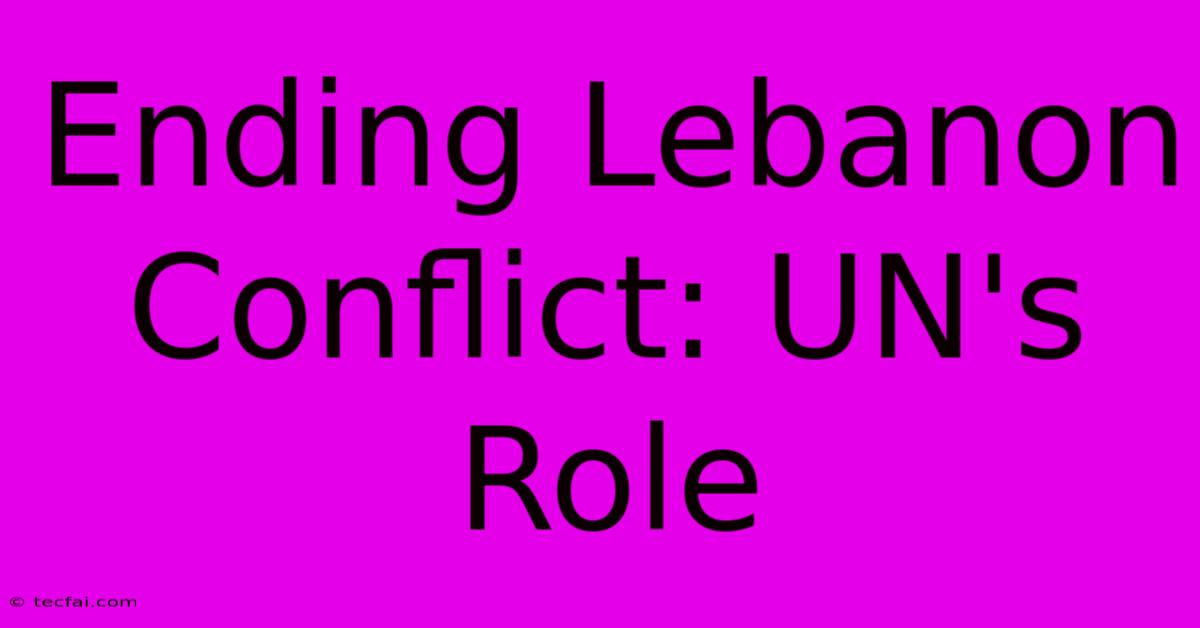Ending Lebanon Conflict: UN's Role

Discover more detailed and exciting information on our website. Click the link below to start your adventure: Visit Best Website tecfai.com. Don't miss out!
Table of Contents
Ending the Lebanon Conflict: The UN's Crucial Role
The ongoing instability in Lebanon is a complex humanitarian and political crisis demanding international attention. The United Nations (UN) plays a pivotal role in navigating this turbulent landscape, striving to facilitate peace, provide humanitarian aid, and support the Lebanese people in their pursuit of stability. Understanding the UN's involvement is crucial to comprehending the challenges and potential pathways towards a lasting resolution in Lebanon.
The Depth of the Crisis: Understanding Lebanon's Plight
Lebanon’s struggles are multifaceted, stemming from a confluence of factors. The 2020 Beirut port explosion exacerbated pre-existing economic woes, pushing the nation into a severe financial crisis. Political instability, sectarian tensions, and the ongoing Syrian refugee crisis further complicate the situation. The lack of effective governance and rampant corruption hinder any attempts at meaningful reform.
Key Challenges Facing Lebanon:
- Economic Collapse: Hyperinflation, unemployment, and widespread poverty cripple the nation's ability to function effectively.
- Political Gridlock: Deep-seated divisions between political factions prevent the formation of a stable and functional government.
- Refugee Crisis: The influx of Syrian refugees places immense strain on Lebanon's already fragile infrastructure and resources.
- Corruption and Lack of Accountability: Widespread corruption undermines public trust and hinders efforts at economic recovery and political reform.
The UN's Multifaceted Approach to Peacebuilding in Lebanon
The UN's response to the Lebanese crisis is multifaceted, encompassing various initiatives aimed at addressing the root causes of conflict and providing immediate humanitarian assistance.
1. Humanitarian Aid and Relief Efforts:
The UN and its agencies, including UNHCR, WFP, and UNICEF, are at the forefront of delivering essential humanitarian aid to vulnerable populations. This includes providing food, water, shelter, medical care, and education. Their efforts are critical in mitigating the immediate suffering caused by the economic collapse and the refugee crisis.
2. Political Mediation and Dialogue:
The UN plays a crucial role in mediating between various political factions in Lebanon, facilitating dialogue and encouraging compromise. This often involves supporting internal peace talks and fostering collaboration between the Lebanese government and other stakeholders. The UN's Special Coordinator for Lebanon is central to these efforts.
3. Supporting Security Sector Reform:
The UN assists in building the capacity of Lebanon's security forces through training, equipment, and advisory support. This is crucial for maintaining internal security and preventing further escalation of violence. However, progress in this area often faces significant hurdles due to political sensitivities and competing interests.
4. Promoting Good Governance and Rule of Law:
The UN supports efforts to combat corruption, strengthen the rule of law, and promote good governance in Lebanon. This involves providing technical assistance, capacity building, and advocating for reforms that enhance transparency and accountability.
5. Addressing the Refugee Crisis:
The UN works closely with the Lebanese government and other international partners to manage the Syrian refugee crisis. This includes providing assistance to both refugees and host communities, working towards durable solutions such as voluntary repatriation or resettlement.
Obstacles and Future Prospects
Despite the UN's significant efforts, several obstacles hinder progress towards a lasting resolution in Lebanon. These include the deeply entrenched political divisions, the economic crisis's severity, and the lack of political will for meaningful reform. The international community's commitment and continued financial support are vital.
The future of Lebanon hinges on a combination of internal political reform, international assistance, and a genuine commitment from all stakeholders to prioritize the needs of the Lebanese people. The UN's continued engagement and adaptability in its approach remain crucial to navigating this complex and challenging situation. Ultimately, lasting peace requires a collaborative effort – one where the UN's role as a facilitator, mediator, and provider of humanitarian assistance is paramount.

Thank you for visiting our website wich cover about Ending Lebanon Conflict: UN's Role. We hope the information provided has been useful to you. Feel free to contact us if you have any questions or need further assistance. See you next time and dont miss to bookmark.
Featured Posts
-
Spurs Vs Jazz November 26 2024 Highlights
Nov 27, 2024
-
Missing Hand Update On Morgan Freeman
Nov 27, 2024
-
Moana 2 Maganda Pero Mahirap Talunin Ang Orihinal
Nov 27, 2024
-
Vancouver Swift Reselling No View Tickets
Nov 27, 2024
-
Meet Barbra Banda Bbc Womens Footballer
Nov 27, 2024
